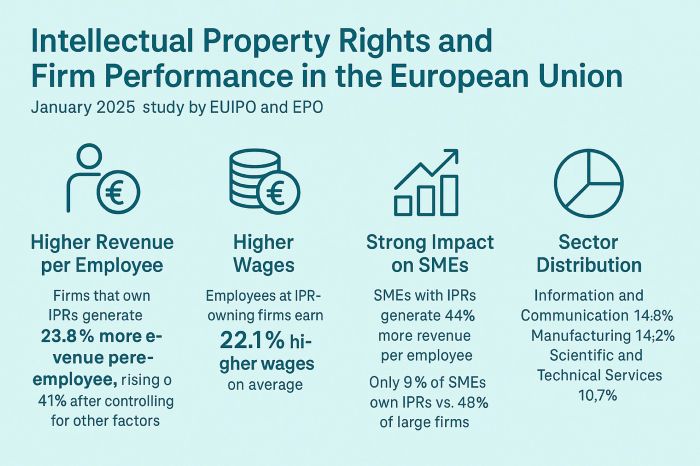


IP Right Holders Do Better
IP Right Holders do better
Findings of the “Intellectual Property Rights and Firm Performance in the European Union” firm-level analysis report by the EUIPO (European Union Intellectual Property Office) and the EPO (European Patent Office) of January 2025
(Image created by ChatGPT)
Background and Objective of the Study
This study investigates the impact of Intellectual Property Rights (IPRs) – including patents, trademarks and registered designs – on the economic performance of companies in the EU. It covers both large firms and small and medium-sized enterprises (SMEs). The goal is to highlight the strategic importance of IPRs in enhancing business growth, innovation, and competitiveness.
Key Findings
1. Higher Revenue per Employee
Firms that own IPRs generate:
- on average, 23.8% more revenue per employee than firms without IPRs.
- after controlling for variables such as sector, company size, and location, the revenue advantage increases to 41%.
2. Higher Wages
- Employees at IPR-owning firms earn 22.1% higher wages on average than those at firms without any IPRs.
3. Strong Impact on SMEs
- SMEs with IPRs perform significantly better, generating 44% more revenue per employee compared to SMEs without IPRs.
- However, only about 9% of SMEs in the EU own any form of IPR, compared to 49% of large companies.
4. Sector Distribution
Firms owning IPRs are more commonly found in:
- Information and Communication (14.8%)
- Manufacturing (14.2%)
- Scientific and Technical Services (10.7%)
5. Multiple IPRs = Greater Advantage
- Companies that own more than one type of IPR (e.g., both patents and trademarks) experience an even stronger positive impact on performance.
Conclusion: The Strategic Importance of IPRs for European Businesses
The 2025 study by the EUIPO and EPO clearly demonstrates that IPRs are not merely legal tools – they are key strategic assets that significantly enhance business performance, particularly in today’s highly competitive, innovation-driven economy.
While large firms more frequently register IPRs, the report highlights that SMEs benefit the most when they do so. SMEs with IPRs generate 44% more revenue per employee – a transformative figure for businesses operating with limited resources. Despite this, only 9% of SMEs currently hold registered IPRs. This gap represents a missed opportunity and highlights the urgent need for greater awareness, support, and access to IP systems for smaller firms.
Final Takeaway
Intellectual property rights are no longer optional for firms seeking growth—they are a strategic necessity. For both policymakers and business leaders, the message is clear:
- Encourage investment in IP
- Build support structures for SMEs
- Integrate IP strategy into core business planning
In a knowledge-based economy, the ability to create, protect, and leverage intellectual assets is a decisive factor for success – both at the firm level and for the broader European economy.
The full report is accessible under https://www.euipo.europa.eu/de/publications/firm-level-analysis-report-january-2025.
Related
- 1 December 2017: Madrid Monitor takes its place as the one and only tool for tracking international trademarks
- 1 January 2020 - Changes in Classifications - Trademarks, Designs, Patents and Utility Models
- 100th Anniversary of Bavaria (Germany) - A glance at trademarks, start-ups, innovation & events
- 10th Anniversary Edition - 10 Things to Know about LexDellmeier - Past, Present & Future
- 15 Years LexDellmeier - 2024 New Year Wishes
- 2024 World IP Day - Building Our Common Future with Innovation and Creativity
- A guide for influencers, Part 1: Protecting your own intellectual property
- A guide for influencers, Part 2: Minding the intellectual property of others
- A new legal EU framework regulating Artificial Intelligence
- All these small Gimmicks – Trademark Infringement?
